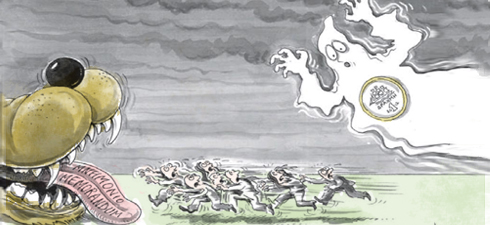Although Sunday's elections should be extremely important, the key day will not be June 17. That key day, rather, will be the day the troika comes back to Athens to meet the new government that emerges from the election, whatever shape that government will take. If a move to cancel the memorandum unilaterally still existed by then, such a meeting would not take place, and there would be no further discussion.
Now that this possibility has been ruled out, the meeting between the new government and the troika will indeed take place. It will, however, be a very painful experience for those at it, especially those who hope that the German attitude will change. Yesterday Chancellor Merkel and her Finance Minister Schäuble once again made clear that such a scenario would not arise.
Total inflexibility
"The question of whether Greece will apply the programme or not is also the question of who respects what in Europe today," the German Chancellor declared. Schäuble has gone a step further by predicting the decision of the troika: “It will confirm that the memorandum is not being applied, whatever the outcome of the elections."
In this case, Mr. Schäuble made a prediction of very low risk, because whatever the outcome of the elections, the programme no longer applies anyway: it has passed into oblivion, and at all levels. The German attitude to Greece has already been decided as well – total inflexibility.
In fact, Pasok leader Evangelos Venizelos has stressed his party’s willingness to work with a Syriza government by insinuating that the new great party of the country must share the responsibilities that will weigh on this meeting (with the troika) and share the ensuing decisions that will come out of it – or that will lead to an impasse and come to no successful conclusion. Indeed, Venizelos knows very well that the troika is capable of stopping everything and leaving (which it did on September 2).
A national unity government?
The real impasse will therefore not come up on Sunday, but on that day the troika sits down with the new government. If in the meantime the country cannot form a government, or if the government that is put together can make no decisions, the outcome will be the same: all the pressure will be focussed on the threat of cutting off the funding for Greece’s internal needs, while – initially at least – external needs concerning the single currency will still be covered. It will be a race against time, in which the Greek side will be in a difficult and ever weaker position.
In such a scenario, a true impasse, one thing however is certain: a national unity government will be essential. Because only this type of government can request a delay in implementing the program – the only thing that it can change – and this, of course, provided that certain things will start immediately, for example through privatisation (of the railways, for one).
Can this national unity government come about? It will be difficult. Next week, the country will enter into the final and most difficult stretch. The question is not whether Syriza will come into power – that is secondary – but how the country can withstand the pressure, whatever the party in government. The predictions are not reassuring.
Every day this week Presseurop is publishing an article on the Greek elections from the Greek press.
Was this article useful? If so we are delighted!
It is freely available because we believe that the right to free and independent information is essential for democracy. But this right is not guaranteed forever, and independence comes at a cost. We need your support in order to continue publishing independent, multilingual news for all Europeans.
Discover our subscription offers and their exclusive benefits and become a member of our community now!












